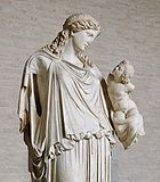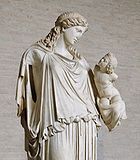
Plutus
Encyclopedia

Greek mythology
Greek mythology is the body of myths and legends belonging to the ancient Greeks, concerning their gods and heroes, the nature of the world, and the origins and significance of their own cult and ritual practices. They were a part of religion in ancient Greece...
. He was the son of Demeter
Demeter
In Greek mythology, Demeter is the goddess of the harvest, who presided over grains, the fertility of the earth, and the seasons . Her common surnames are Sito as the giver of food or corn/grain and Thesmophoros as a mark of the civilized existence of agricultural society...
and the demigod Iasion
Iasion
In Greek mythology, Iasion or Iasus was usually the son of Electra and Zeus and brother of Dardanus. Iasion founded the mystic rites on the island of Samothrace. With Demeter, he was the father of twin sons named Ploutos and Philomelus, and another son named Korybas...
, with whom she lay in a thrice-ploughed field. In the theology of the Eleusinian Mysteries
Eleusinian Mysteries
The Eleusinian Mysteries were initiation ceremonies held every year for the cult of Demeter and Persephone based at Eleusis in ancient Greece. Of all the mysteries celebrated in ancient times, these were held to be the ones of greatest importance...
he was regarded as the Divine Child. His relation to the classical
Classical mythology
Classical mythology or Greco-Roman mythology is the cultural reception of myths from the ancient Greeks and Romans. Along with philosophy and political thought, mythology represents one of the major survivals of classical antiquity throughout later Western culture.Classical mythology has provided...
ruler of the underworld Plouton
Pluto (mythology)
In ancient Greek religion and myth, Pluto was a name for the ruler of the underworld; the god was also known as Hades, a name for the underworld itself...
(Latin Pluto), with whom he is often conflated
Conflation
Conflation occurs when the identities of two or more individuals, concepts, or places, sharing some characteristics of one another, become confused until there seems to be only a single identity — the differences appear to become lost...
, is complex, as Pluto was also a god of riches.
Plutus in the arts
In the philosophized mythology of the later Classical period, Plutus is envisaged by AristophanesAristophanes
Aristophanes , son of Philippus, of the deme Cydathenaus, was a comic playwright of ancient Athens. Eleven of his forty plays survive virtually complete...
as blinded by Zeus
Zeus
In the ancient Greek religion, Zeus was the "Father of Gods and men" who ruled the Olympians of Mount Olympus as a father ruled the family. He was the god of sky and thunder in Greek mythology. His Roman counterpart is Jupiter and his Etruscan counterpart is Tinia.Zeus was the child of Cronus...
, so that he would be able to dispense his gifts without prejudice; he is also lame, as he takes his time arriving, and winged, so he leaves faster than he came. When the god's sight is restored, in Aristophanes' comedy
Plutus (play)
Plutus is an Ancient Greek comedy by the playwrightAristophanes, first produced c. 388 BC. A political satire on contemporary Athens, it features the personified god of wealth Plutus...
, he is then able to determine who is deserving of wealth, creating havoc.
Among the Eleusinian figures painted on Greek ceramics, Plutus, whether a boy child or a youthful ephebe
Ephebos
Ephebos , also anglicised as ephebe or archaically ephebus , is a Greek word for an adolescent age group or a social status reserved for that age in Antiquity....
, is recognized by the cornucopia
Cornucopia
The cornucopia or horn of plenty is a symbol of abundance and nourishment, commonly a large horn-shaped container overflowing with produce, flowers, nuts, other edibles, or wealth in some form...
, or horn of plenty, that he bears. In later, allegorical
Allegory
Allegory is a demonstrative form of representation explaining meaning other than the words that are spoken. Allegory communicates its message by means of symbolic figures, actions or symbolic representation...
bas-reliefs, Plutus is a boy in the arms of Eirene
Eirene (Greek goddess)
Eirene, or Irene |Pax]]), one of the Horae, was the personification of peace, and was depicted in art as a beautiful young woman carrying a cornucopia, sceptre and a torch or rhyton. She is said sometimes to be the daughter of Zeus and Themis....
, as Prosperity is the gift of "Peace", or in the arms of Tyche
Tyche
In ancient Greek city cults, Tyche was the presiding tutelary deity that governed the fortune and prosperity of a city, its destiny....
, the Fortune of Cities.
In Lucian of Samosata's satirical dialogue Timon, Ploutus, the very embodiment of worldly goods written up in a parchment will, says to Hermes:
- "it is not Zeus who sends me, but Pluto, who has his own ways of conferring wealth and making presents; Pluto and Plutus are not unconnected, you see. When I am to flit from one house to another, they lay me on parchment, seal me up carefully, make a parcel of me and take me round. The dead man lies in some dark corner, shrouded from the knees upward in an old sheet, with the cats fighting for possession of him, while those who have expectations wait for me in the public place, gaping as wide as young swallows that scream for their mother's return."
In Canto VII of Dante
Dante Alighieri
Durante degli Alighieri, mononymously referred to as Dante , was an Italian poet, prose writer, literary theorist, moral philosopher, and political thinker. He is best known for the monumental epic poem La commedia, later named La divina commedia ...
's Divine Comedy
The Divine Comedy
The Divine Comedy is an epic poem written by Dante Alighieri between 1308 and his death in 1321. It is widely considered the preeminent work of Italian literature, and is seen as one of the greatest works of world literature...
poem Inferno
Inferno (Dante)
Inferno is the first part of Dante Alighieri's 14th-century epic poem Divine Comedy. It is followed by Purgatorio and Paradiso. It is an allegory telling of the journey of Dante through what is largely the medieval concept of Hell, guided by the Roman poet Virgil. In the poem, Hell is depicted as...
, Plutus (Pluto in the original Italian) is a wolf
Gray Wolf
The gray wolf , also known as the wolf, is the largest extant wild member of the Canidae family...
-like demon of wealth which guards the fourth circle of the Inferno
Hell
In many religious traditions, a hell is a place of suffering and punishment in the afterlife. Religions with a linear divine history often depict hells as endless. Religions with a cyclic history often depict a hell as an intermediary period between incarnations...
, the Hoarders and the Wasters. Dante almost certainly conflated Plutus with Pluto
Pluto (mythology)
In ancient Greek religion and myth, Pluto was a name for the ruler of the underworld; the god was also known as Hades, a name for the underworld itself...
, the Roman god of the Underworld.
In the 2010 video game reimagining of Dante's Inferno
Dante's Inferno (video game)
Dante's Inferno is a 2010 action-adventure video game developed by Visceral Games and published by Electronic Arts for the Xbox 360 and PlayStation 3 consoles. The game was also released on the PlayStation Portable and was developed by Artificial Mind and Movement...
, an enormous golden statue of Plutus is found in the fourth circle of Hell. Although referred to metaphorically as "the great wolf", the statue is humanoid. The light from its gaze can instantly forge molten gold into solid gold statues.
The linguistic root pluto-
Like many other figures in Greek and Roman mythology, Plutus' name is related to several English words. These include:- plutocracyPlutocracyPlutocracy is rule by the wealthy, or power provided by wealth. The combination of both plutocracy and oligarchy is called plutarchy. The word plutocracy is derived from the Ancient Greek root ploutos, meaning wealth and kratos, meaning to rule or to govern.-Usage:The term plutocracy is generally...
, rule by the wealthy, and plutocrat, one who rules by virtue of wealth - plutonomics, the study of wealth management
- plutolatry, the "worship" of money
- plutomania, the delusion that one is immensely wealthy

